Christian Brechneff interviewed by TETRAKTYSMAG
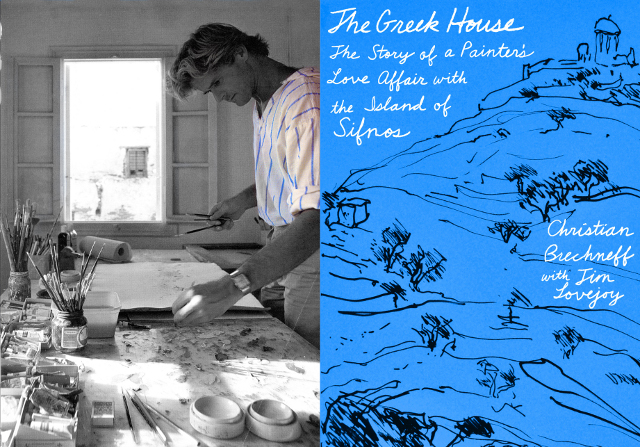
courtesy of the artist Christian Brechneff
“The Greek House, The Story of a Painter's Love Affair with the Island of Sifnos” written by Christian Brechneff with Tim Lovejoy caught our attention with its cover and the long title and held it with its story too. It was not difficult to find the author and compose our questions for him. The truth is that we are dealing with a painter’s love story, sprinkled with humor and Greek drama. You will find out why!
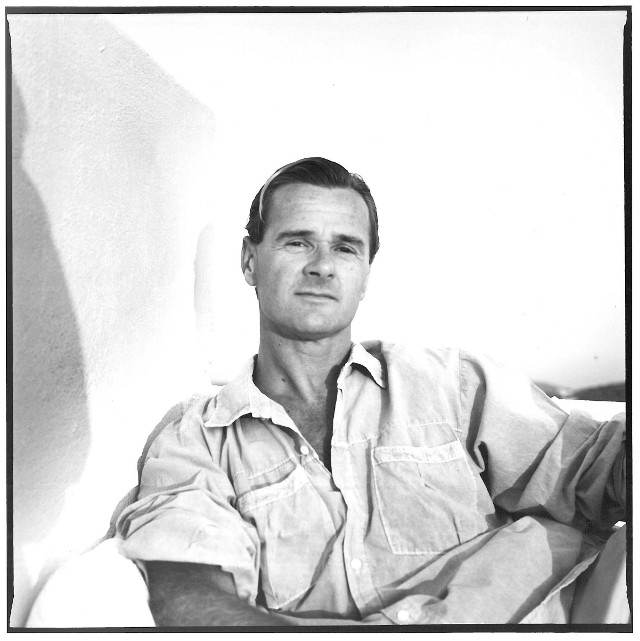
courtesy of the artist Christian Brechneff
P+A: We would like to welcome you on behalf of our readers. It's been a while since our last talk due to a flu that kept us and our kids laid up for long time. And in truth, your book kept us very good company and we really enjoyed reading it (Peris twice, Angie once).
C.P.B.: Thank you Peris and Angie and Tetraktys Mag for taking the time to read The Greek House and for letting me be part of your wonderful magazine. I am thrilled to answer your questions.
P+A: In the very first pages of your book you describe an island of primitive and raw beauty that fascinated and inspired your artwork. How would you paint Sifnos island nowadays?
C.P.B.: In the over 30 years that I have painted on Sifnos I went from very dark melancholic colors in the early seventies to violent reds and yellows in the eighties and nineties and to black and white ink drawings by 2000. If I were to work again on Sifnos – and I may well – I would most likely pick up where I left in 2000 and continue with black and white. The forms and shapes are so strong it is almost all you need.
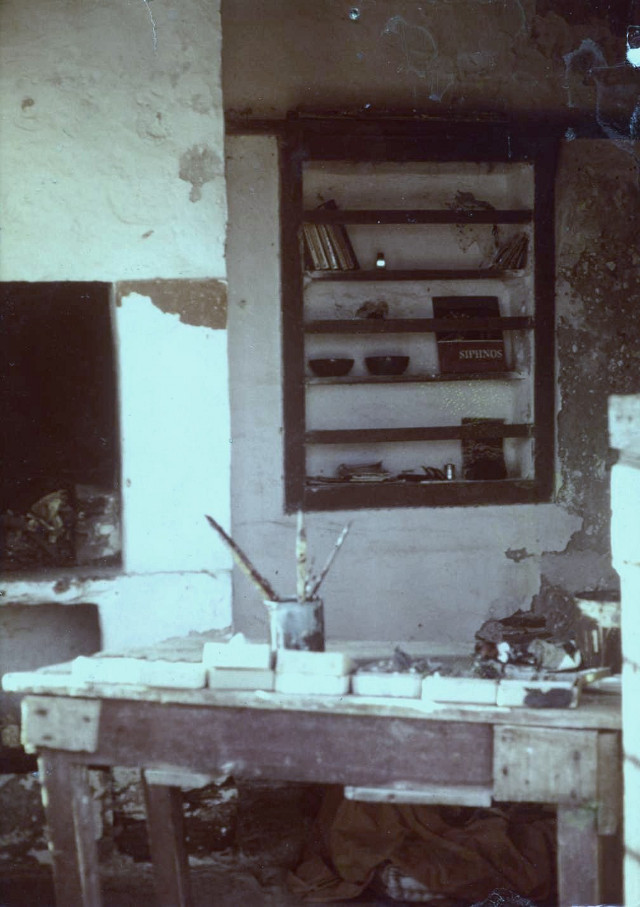
courtesy of the artist Christian Brechneff
P+A: When you reached Sifnos in 1972 for the first time you stayed in a ruin. Did you consider yourself a monk within the art world?
C.P.B.: I was 21 years old and I had very little money. The ruin was free. I never thought about what living in the ruin would mean as an “image” for an artist, I simply lived there because it was free and I painted many good pictures there that first summer.
P+A: Do you believe that Sifnos in combination with your youthful and independent spirit was (or should we better say is) your life-long lover (we refer to your phrase in the book) concerning the freedom of artistic expression and production of artworks and the success?
C.P.B.: I believe you can fall in love with a place – and I did fall in love with Sifnos – but a lover to me always includes sexual intimacy. The island was extremely sexually charged – but the island was not my lover -. many love affairs come to an end and my love affair with Sifnos did come to an end and i did sell my house. So “life long” is not really correct. The book is so much about “passage of time”, “coming of age” so yes – for a certain time in my life i was very much in love with Sifnos but it was never “my lover”. There is a difference.
P+A: As we read your book we noticed that when you were young, you were fond of a series of air-plane pictures you painted. Was it a way to escape from being dropped by fiends in those days?
C.P.B.: Painting to me at the tender age of 16 and 17 became an escape from the hardships at school, the bullying by schoolmates and the pressure from the difficult examinations. The air-plane paintings grew from my experience of flying for the very first time from Basel to London in 1967. but I went to England to learn English, not to escape bullies or friends who may or may not have "dropped" me.
P+A: Is art really an escape? A way of expressing your feelings, reproducing memories on a canvas?
C.P.B.: I think alcohol, drugs, too much food or sex can be an escape from a certain reality. One can also escape to places and Sifnos was an escape in a way. I had been in the army in Switzerland and i needed a calm peaceful place to work. I chose Sifnos. Being an artist, creating art is about discipline, a lot of discipline and being a painter was never an escape for me. It was a hard reality I had to work with. A very lonely path and it sort of chose me. I never decided to become a painter. I simply grew into being a painter. And the Royal College of Art three year MA program in London where I studied was most creative and helpful. It taught me a lot about discipline. Like a person with a great voice; you need to train and discipline the voice to become a good singer. With painting it is the same; the talent alone will not do. Learning how to actually draw is major.
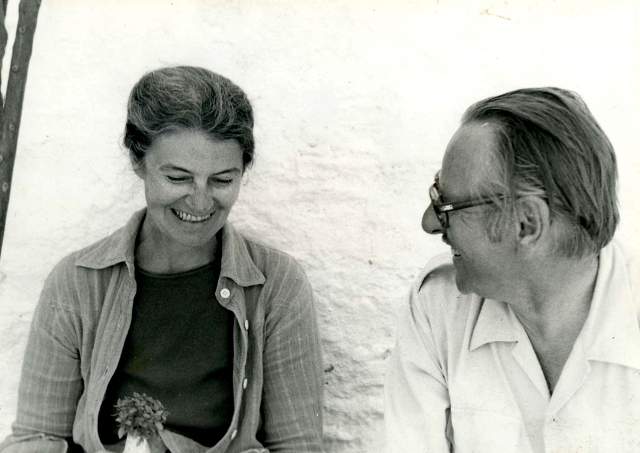
courtesy of the artist Christian Brechneff
P+A: Was Sifnos also an escape from the formal, strict, sterilized, conservative Swiss family prototype of that period?
C.P.B.: You have to remember that my own family was not conventional. My father was a Russian emigre – wildly romantic, incredibly handsome and unconventional – choosing to be a doctor in the Belgian Congo where I was born. My mother was more conventional and bourgeois but she became a Jungian analyst and was very tolerant and curious about life. By choosing my father as a husband and not some high geboren rich Swiss she also escaped the trappings of Swiss society even though they eventually settled in Basel after living in Africa. I had studied at a liberal Art`s college in the USA [St.Olaf`s college] and had traveled extensively, so my going to Sifnos in 1972 had little to do with my family or Switzerland but simply with the need for a peaceful place. And I got lucky.
P+A: As a bullying victim in your childhood what would be your advice to your young readers?
C.P.B.: I think most young boys [and girls] who go through puberty realizing that they are attracted to the same sex will go through a certain amount of bullying from schoolmates. It will most likely never go away. But one is so young at the time that you barely know what exactly is going on. You just try to get through it all. I chose to paint to be different. Others become very funny and comics to stand out – and some excel academically or withdraw etc.. I grew up in the Sixties, a very very different time from today. I had to follow my instincts and be honest to myself. Easier said than done, certainly in my time when we had no role models, no internet to chat with anyone with the same feelings. You really really were alone.
P+A: Referring to your Russian origin, how would you describe Putin's law about homosexuals?
C.P.B.: Disgustingly frightening.
P+A: You may have heard about gay suicide or harassment incidents around the world. Can you tell us your opinion why homophobia is still an issue to developed countries?
C.P.B.: As I have mentioned before harassing gays will continue no matter what. It is often people with their own homosexual problems who are the most homophobic. The fear of the otherness. The fear of the unknown and ultimately also the unspoken attraction to the same sex. Culturally, so many countries still lack any kind of education about homosexuality and their religions often impose very strict laws. In Russia it is very much the Russian orthodox church that enables the present homophobia.
P+A: Is it difficult acting as a different person than you really are, meaning your sexual orientation and your attitude towards your family and Sifniot friends? Did you fear that revealing your secret would hurt them or did you act unintentionally?
C.P.B.: I never had a secret on Sifnos. And neither did I have one towards my family. I was simply discreet and never rubbed my sexual orientation into peoples' faces. But I did not live a lie. If anyone asked me if i was gay I would be honest about it. But in those days nobody would ask that question. And I would not really allow such an intimate question to happen unless I was interested in going to bed with that person. What I did in the bed room was really nobody’s business. And the Sifniots never truly questioned me. They were tolerant and open minded. And they loved me. I very much did not want to ever offend them with my sexuality. It was my own problem. I was sexually very confused as you can read in the book. I had serious affairs with women and I liked sleeping with women. My problem simply was that when I fell truly in love- and most of us know what that feels like – I fell in love with a man. But as I write in the book in over 35 years I never as much as touched a Sifniot. Man or woman. That WAS a wise move.
P+A: You say at the end of your book that you left Sifnos because the “Christo” known by the islanders was not you but a fictional character. Do you think that you may had some responsibility for this? Maybe your attitude and behavior provoked this and you could not bear to reveal the real you?
C.P.B.: As I have said before I did not have a secret nor did I live a lie. But the combination of Sifnos and my own sexual confusion and insecurities as a young man allowed this “calo pedi” to emerge, This perfect child, and I liked being Christo. My parents came regularly to the island and my letters to them included in the book testify to our closeness. I also wanted to please them. I wanted them to be proud of me and they were. Whether I was sleeping with men or women they did not really care [and I believe the Sifniots did not really care either as long as I was discreet and did not seduce their sons] but I cared and I liked hiding my true self behind that “other“ person. So yes – I was responsible for Christo and no one else. But after the age of fifty, and once I had become secure with my sexuality I had no desire to continue being Christo. But my selling the house had not that much to do with the sexual orientation issue: I stopped painting there. THAT was the real problem.
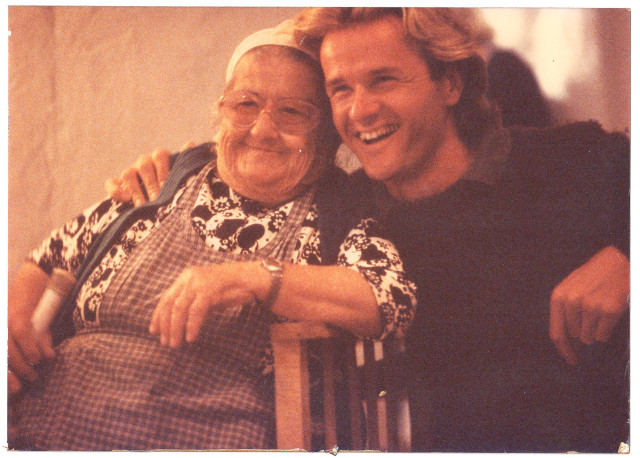
courtesy of the artist Christian Brechneff
P+A: Do you have any contacts with your former neighbors in Exambela?
C.P.B.: The lady I describe in the book as a former Swedish bra model living in a house right behind my former house sent me the nicest letter. She very much loved the book. But the others do not read English and I do not believe they are aware of the book. Most of my closest neighbors like Popi whom I loved are all dead by now.
P+A: Which Greek habit/superstition/festivity are you fond of and which you not?
C.P.B.: I love the evil eye and my neighbor taught me a lot about it. [I write about that too] All the church festivities are wonderful; I loved Easter with the devil banging on the door at midnight. I truly felt part of my village in those moments, standing in front of my house with the windows full of candles. It was very moving to me.
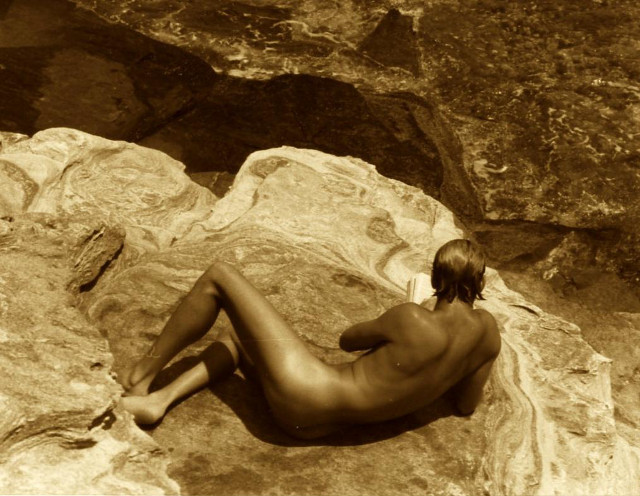
courtesy of the artist Christian Brechneff
P+A: Do you miss your rock (rocher secret)?
C.P.B.: I think about that rock very often. I hope my relatives will sprinkle some of my ashes into the Aegean sea right there from that rock once I am not part of this world anymore. When I am there I forget time:"...what year is it..."??? the rock is the same, the water, the light...I can feel the passage of time.
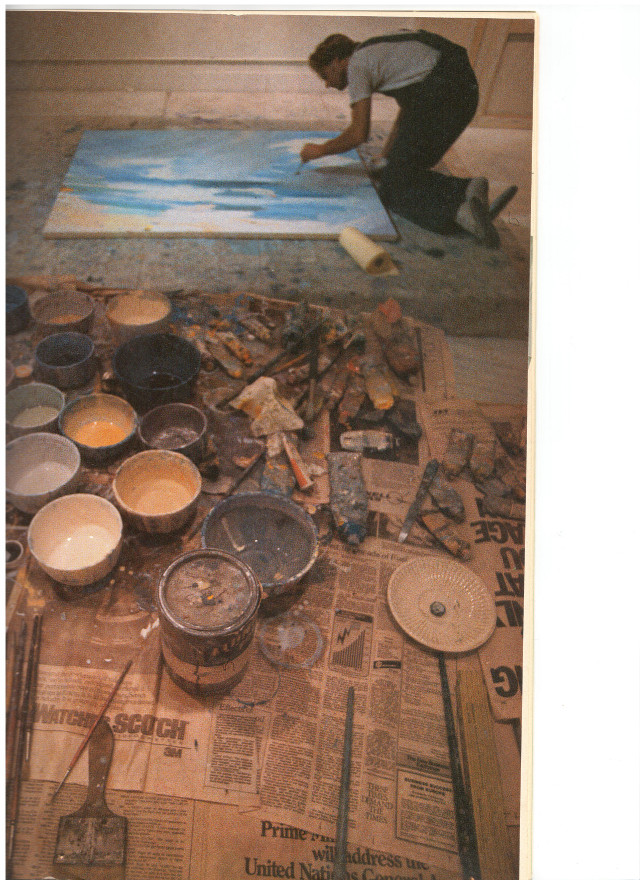
courtesy of the artist Christian Brechneff
P+A: In your book you cover four or five decades of Greek history. What color would you give to each one of them?
C.P.B.: I am not quite sure how to answer this question: I arrived in 1972 while the military Junta was still in power and Greece had a King. I left in 2008 with the Euro and the integration of Greece within the European community complete. The decade of the Junta was definitely dark, the remaining decades i truly don’t know how to label them with a color.
P+A: In your book there are many truths about Greek people and the new generation. Do you think that Greeks have lost their identity and spirit and became more “globalized”? Can you explain what did go wrong and if they can re-find their roots?
C.P.B.: This is a very complex questions. Greece is not alone with facing the harsh realities of globalization and a loss of identity largely due to immigration problems. Switzerland is facing similar problems. But Greece was always a very small society - a one religion country – there are barely any Jews. As in many countries, there is anti-semitism in Greece There are almost no Protestants or Catholics in Greece. This is slightly dangerous as it spreads intolerance much easier. Remember Hitler did not just put Jews into concentration camps. Homosexuals too. Its a small step from hating one to hating the other. I was always asked about my religion on Sifnos and since my father was Russian orthodox I seemed acceptable. But I have great faith in the innovative Greek people and their wonderful characters and the present crisis will pass and good things will come from it. Ever the optimist.
P+A: Is it the people that make a place loveable or the physical environment?
C.P.B.: You can be in the most dazzlingly beautiful place and not feel good because you don’t like the people there. Sifnos was unique: the people were so welcoming, warm and extraordinarily hospitable in the seventies that it was easy to fall in love with its extraordinary landscape. To fall in love with a place you need a certain roundness. Place and people should come together as one.
P+A: As we are getting older are we getting wiser or weirder?
C.P.B.: wiser I hope
P+A: How would you fill the phrase, “Life is......”?
C.P.B.: “Life is like a blank canvas ready to surprise you”
P+A: If memories were an album with photographs, in which page would you turn to?
C.P.B.: I don’t have enough pages...
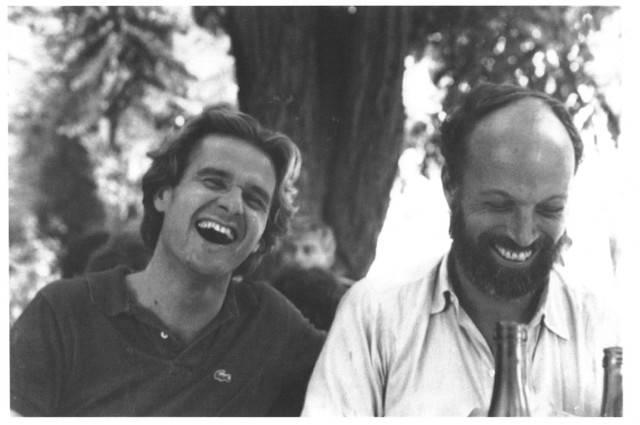
courtesy of the artist Christian Brechneff
P+A: You hated the screaming blue tiles of the house but you use the same color for your book cover, not to mention your partners' eyes color. It seems that you eventually got used of it? (laughs).
C.P.B.: The Sifniot tiles merchant was right and I was wrong. The blue tiles were perfect and much admired by the village neighbors. It just took me a while to realize that. I had to fight for the blue cover of the book. Originally it was a terra cotta Italian color. But I felt very strongly that every Greek who owns The Greek House should be proud of it there on his/her table. I wanted the Greek flag colors – and I got them. And I love the book jacket cover. The designer is a very talented guy.
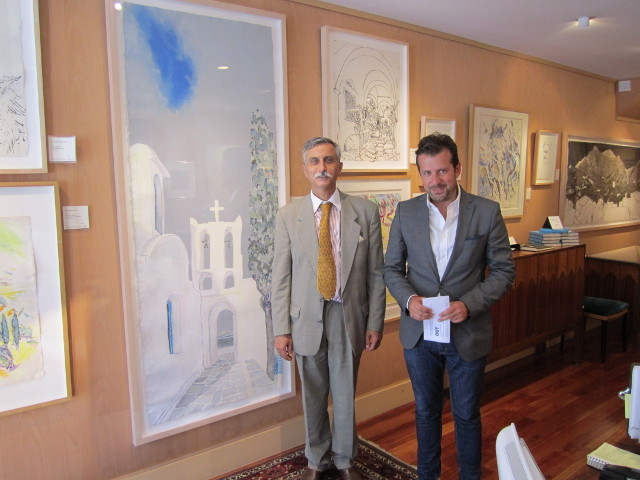
courtesy of the artist Christian Brechneff
P+A: To end our interview, we would like to comment that when we finished reading your book and getting back to the Mikhail Lermontov's poem “The Sail” it seems that you are a good captain after all. However, do you regret for any of your choices?
C.P.B.: I regret not having had the guts to choose the blue tiles. [laughs]
P+A: It is really a pleasure meeting you and we deeply thank you for dedicating some of your valuable time to answer our questions. We wish you the best for you and Tim.
C.P.B.: Thank you Peris and Angie. I hope I could give your readers some insights into my life and my book. Do all order it. It's a great read.
Christian will be in Basel (Switzerland) from nov.30 - dec.10th 2013 for a reading from the book. An independent Swiss film company is making a documentary film about Christian and his work, locations - and the book - they shall be on sifnos next may filming. They have already done 5 days of filming in the US (Long Island and New York) about Christian's wedding with Tim after 36 years. Christian is also talking to a greek publisher about an english paperback version for greek publication and eventually a greek translation. To find out how to order the book visit "The Greek House, The Story of a Painter's Love Affair with the Island of Sifnos" official website.
.png)



